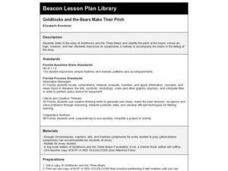Virginia Department of Education
Sound
Add a little music to your next physics class. Pupils discuss how frequency determines pitch and take part in several activities designed to teach them more about sound, melody, resonance, and vibrations. They use materials to construct...
K12 Reader
The Pitch and Volume of Sound
Primary graders are introduced to the concepts of pitch and volume with a reading comprehension instructional activity that focuses on the physics of sound.
Curated OER
High and low notes!
Little ones talk about how sounds can be made high or low depending on the length of the keys that make them. They label eight xylophone keys from highest to lowest depending on the relative sound they'd make. Tip: Get out a real...
Curated OER
Here's the Pitch
Students define pitch, measure varying amounts of water into containers, make predictions about the sounds made when striking the containers, put containers in order from highest to lowest pitch, and create their own sound patterns with...
Curated OER
Sound/Pitch
Students explore how pitch changes when using instruments that are plucked, blown, and hit. In this sound and pitch lesson, students blow across the top of bottles that are filled with water to create sound. Students use recorders...
Curated OER
Musical Mountain
Students listen to low, middle, and high pitches of music and identify if they are low, middle, or high. In this musical pitch lesson plan, students visually see low, middle, and high pitches on a mountain.
Curated OER
How Are Sounds Different?
In this comparing sounds worksheet, students will compare and contrast high pitch and low pitch sounds and loud and soft volume sounds. Students will fill in the blank of 4 statements.
Curated OER
Bells 'n' Scales
Students work together to arrange bells in order from low to high and play songs. They discuss differences in pitch and musical notation.
Curated OER
Vibration and Pitch
Fifth graders investigate the relation between vibrations and pitch. They observe and discuss an experiment involving a bicycle and a piece of cardboard in the spokes, listen to a comb with cardboard, and listen to various sounds and...
Science 4 Inquiry
Musical Vibes with Palm Pipes
Ancient people used musical pipes as early as the third millennium BCE. Young scientists explore the workings of musical pipes to better understand the relationship with frequency, length of pipe, and sound waves. They determine the...
Curated OER
TE Activity: Pitch and Frequency
Learners experiment with a vibrating ruler and a kazoo to study the different pitches and frequencies they produce. They create both high and low pitch sound waves. They examine how engineers use sound energy when designing electronic...
Curated OER
Pitch Drills
Stduents reinforce pitch recognition. Changing passing tones to hums and later to just thinking them in the mind s ear, the pitch phrase is reduced to the skip or interval desir
Curated OER
Recognizing High and Low Pitch
Students distinguish a high pitch from a low pitch, and demonstrate high/low pitch recognition by creating contrasting movements to high and low music, and use instruments to represent the characters in The Three Little Pigs.
Curated OER
Itsy Bitsy Spider & His 2 Friends: Music, Pitch, High and Low Notes
Students gain practice with high and low notes when singing an adaptation of the 'Itsy Bitsy Spider".
Curated OER
Allegro Band Warm-Up & Joyance rehearsal
In need of a high school band lesson? This resource includes a warm up, objectives for learners to focus on, and notes for each part of the song being played. These notes are specific to the learners it is written for, but may give you...
Curated OER
Using Harmonic Vision’s Music Ace Software to Reinforce Basic Music Skills
If you have access to Harmonic Vision’s Music Ace Software, then this instructional activity could work for you. Kindergarteners use the video music software to place, identify, and read musical notes. They listen in and identify both...
Curated OER
Sizing Up Sound
Sixth graders are introduced to the concepts of sound waves and frequency. As a class, they listen to the differences between different types of instruments. To end the lesson, they practice identifying low and high pitches and playing...
Curated OER
Design an Instrument
Students design an instrument. In this sound, vibration and pitch lesson, students learn about the characteristics of sound, vibration and pitch. Students design a guitar using the assembled craft materials and demonstrate how they...
Curated OER
Goldilocks and the Bears Make Their Pitch
First graders listen to the story of Goldilocks and the Three Bears and identify the pitch of the bears' voices as high, medium, and low. They improvise on xylophones a melody to accompany the bears in the telling of the story.
Curated OER
Perfect Pitch
In this pitch worksheet, students make sounds using rubbing alcohol and soda bottles. Students follow 4 sets of directions and answer 4 questions.
Curated OER
Pitch
Second graders investigate the concept of pitch and how it can be changed in its duration and frequency. They use rubber bands and cardboard to demonstrate different sound patterns. Students are asked to recognize how vibration varies...
Curated OER
Sound
In this sound worksheet, students read about sound waves, how they are graphed, what frequency is and how it's related to pitch and the speed of sound. Students solve 8 sections of problems including matching terms related to sound to...
Curated OER
String Telephones and Musical Straws
Fourth graders investigate pitches of sound. For this physical science lesson, 4th graders participate in two activities that help them explore pitch--one activity has them working with string telephones and the amount of tension...
Curated OER
Sound
Students identify and explain these vocabulary words: vibration, volume, pitch, particles, tuning forks, waves and matter. They explain that sound travels through gas, liquid and solid. They be

























